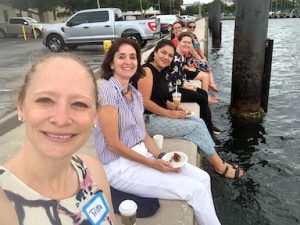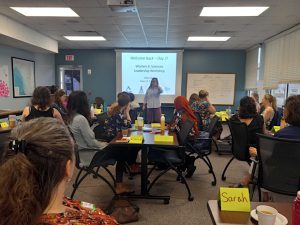by Trista Brophy
Doctoral Candidate in Interdisciplinary Ecology
School of Natural Resources and Environment
The National Atmospheric and Ocean Administration (NOAA) and the Earth Science Women’s Network (ESWN) hosted the two-day Women in Sciences Leadership Workshop. It centered around building personal leadership and management skills for success in scientific organizations. NOAA Program Manager Emily Smith organized, and Chris Olex from The Point facilitated, this training that brought together 30 people who identify as women in the sciences with representation across three major career stages (graduate students, early career, and mid-career). The in-person event was at the University of South Florida’s College of Marine Science in St. Petersburg, Florida. NOAA provided funding to attend and for lodging.

Why did I apply to attend?
As someone deeply interested in personal growth and in helping others succeed, I applied. My hope was to get more training on how to leverage my unique skills to be a good role model, mentor, and leader. I was really excited about the women-focused approach, hoping it would foster open and honest conversation about the many struggles women face as they progress through their careers. I also wanted to connect with others like me, in person, after not being able to do so for nearly two years during the pandemic.
What was discussed in the workshop?
The workshop used interactive and dynamic activities to help us better understand ourselves and all attendees had to complete a full-length DiSC profile assessment prior to the workshop. DISC is a personality tool “to help improve teamwork, communication, and productivity in the workplace” (discprofile.com). The personalized results were then shared with each person on the first day of the event and we did several exercises, both individually and as a group, to explore more about ourselves, our needs, and how we can communicate and engage better with others. The second half of the day was dedicated to learning about emotional intelligence and why it’s important for understanding what drives our behaviors. The second day focused on giving and receiving feedback as well as unconscious bias, connection, and mentoring.
What did you learn about yourself from the DiSC assessment?
I learned that my DiSC style is S, where S stands for “steadiness”. It also is a support-driven personality, meaning I find satisfaction in supporting others. I also like stability in the workplace, like a calm and harmonious environment, predictable work, and consistency. I enjoy collaboration and interaction and don’t want to be the sole decision-maker.
Some things that stress me are working without clear guidelines, dealing with angry, pushy, or argumentative people, and working in a chaotic environment. Some of the limitations of my work personality are that I can be overly accommodating, have a strong tendency to avoid change, and can be indecisive. I learned ways to better work with the D, i, and C styles, which are really useful! The main takeaways from this part of the workshop are that I need to be more firm and stand my ground so that my ideas aren’t stifled, I need to be tougher about enforcing high standards and analyze the details rather than going with the flow, and I need to do better at networking and expressing myself in certain situations.

What is one big takeaway from the workshop?
There were really so many! One quote from the facilitator, Chris, was that “people don’t do things to you…they do things for themselves.” Chris went on to help us understand the emotional needs of humans and how those drive individual behaviors. The basic needs are feeling included, encouragement, respect, consideration, love, safety, being heard and understood, feeling valued, being trusted, being liked and accepted, autonomy, being supported, recognition for achievements, and being appreciated. When people aren’t having their needs met, the amygdala fires off a fight, flight, freeze, or fawn reaction before our neocortex, or thinking brain, has even had a chance to process. Knowing this helps us to be empathetic when having tough conversations or uncomfortable situations. We can also use this to give ourselves and the other person space to process, leading to better outcomes.
What was the most challenging aspect of the workshop?
Even though I like to believe I am already an open and introspective person, I had to push that even further to really reflect on the interactions I have in my life. We had an exercise where we made a list of 10-15 people we interacted with and influenced on a daily or weekly basis. The list could include family, friends, coworkers, roommates, etc. Then we had to score those relationships as a 1, 2, or 3 in terms of what we felt we got from those people, with 1 being basic and bare minimum (when you don’t feel valued), 2 being a little more effort and care (when you feel only somewhat valued), and 3 being extra effort, passion, and personal sacrifice (when you feel very valued).
After scoring what we felt we received from these people, we had to score what we felt we gave. We all would probably like to think we give our best but the truth is that most of us aren’t doing that to all people all the time. This was a challenging reflection for me. I learned there are probably a few people in my life that I need to focus on showing more appreciation to, for the benefit of the relationship overall.
How do you think this workshop will help you to be a better leader?
Well, all the things I already mentioned above will certainly help me show up for others in a more robust and authentic way. The workshop really had me thinking about how important language is, from the way we talk to ourselves to the way we talk to others. Setting a positive intention for any relationship, giving the benefit of the doubt, being clear about the impacts someone’s work, words, or actions have on myself and a team, and treating people as if they are valuable (hint: everyone has value!) are key concepts I’m going to really focus on incorporating in all my interactions.
What do you think people should know about leadership?
- Anyone can be a leader! You don’t need to be in an official leadership position to set a good example, be a great role model and mentor, and be seen as a leader.
- Leaders are responsible for creating an inclusive environment. One of the many ways they can do this is by setting the example of acknowledging when they screw up and taking clear steps to fix it.
- Valued people value people. Treat everyone as if they have something unique to offer and they will not only rise to the challenge, but they will show more appreciation to others along their path.
More information:
Earth Science Women’s Network, an international peer-mentoring network of women in Earth Sciences https://eswnonline.org
DiSC Profile https://www.discprofile.com/what-is-disc
Emotional Intelligence by Psychology Today https://www.psychologytoday.com/us/basics/emotional-intelligence
 0
0
